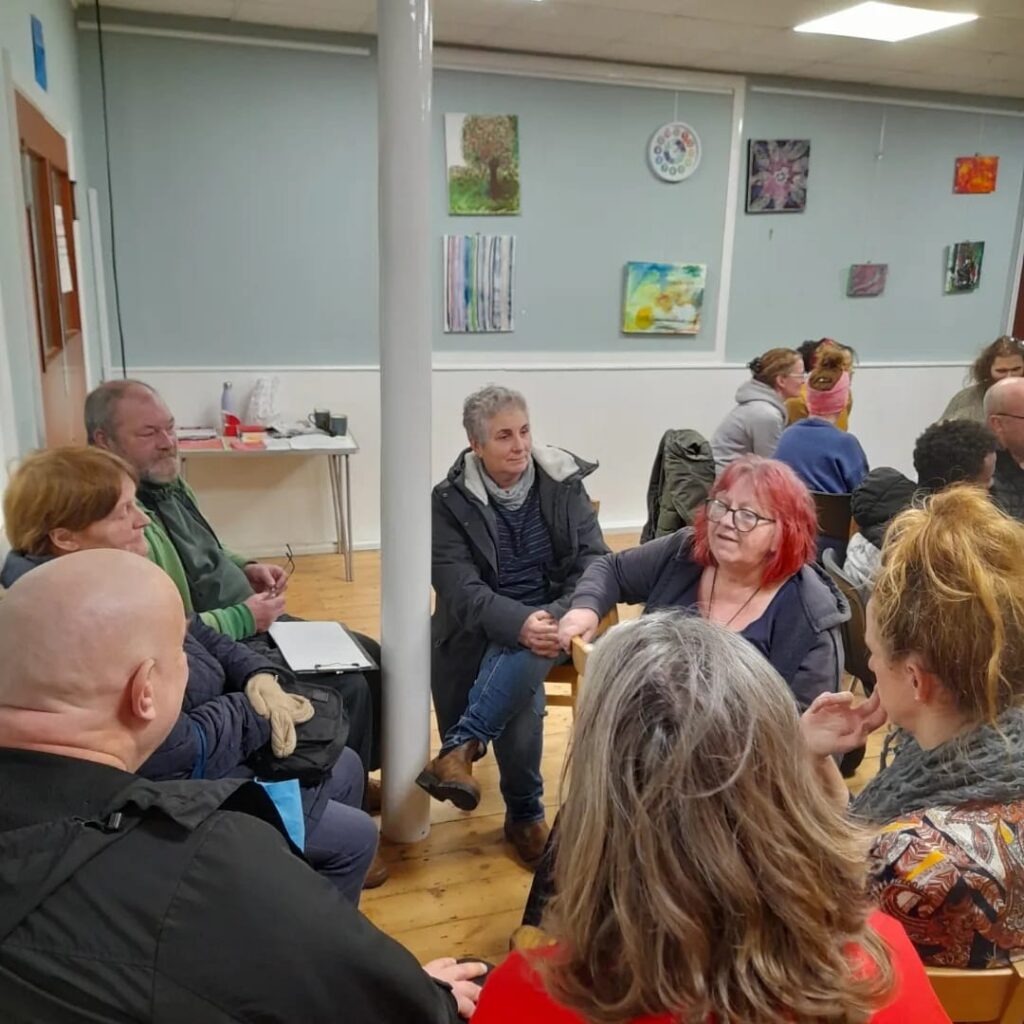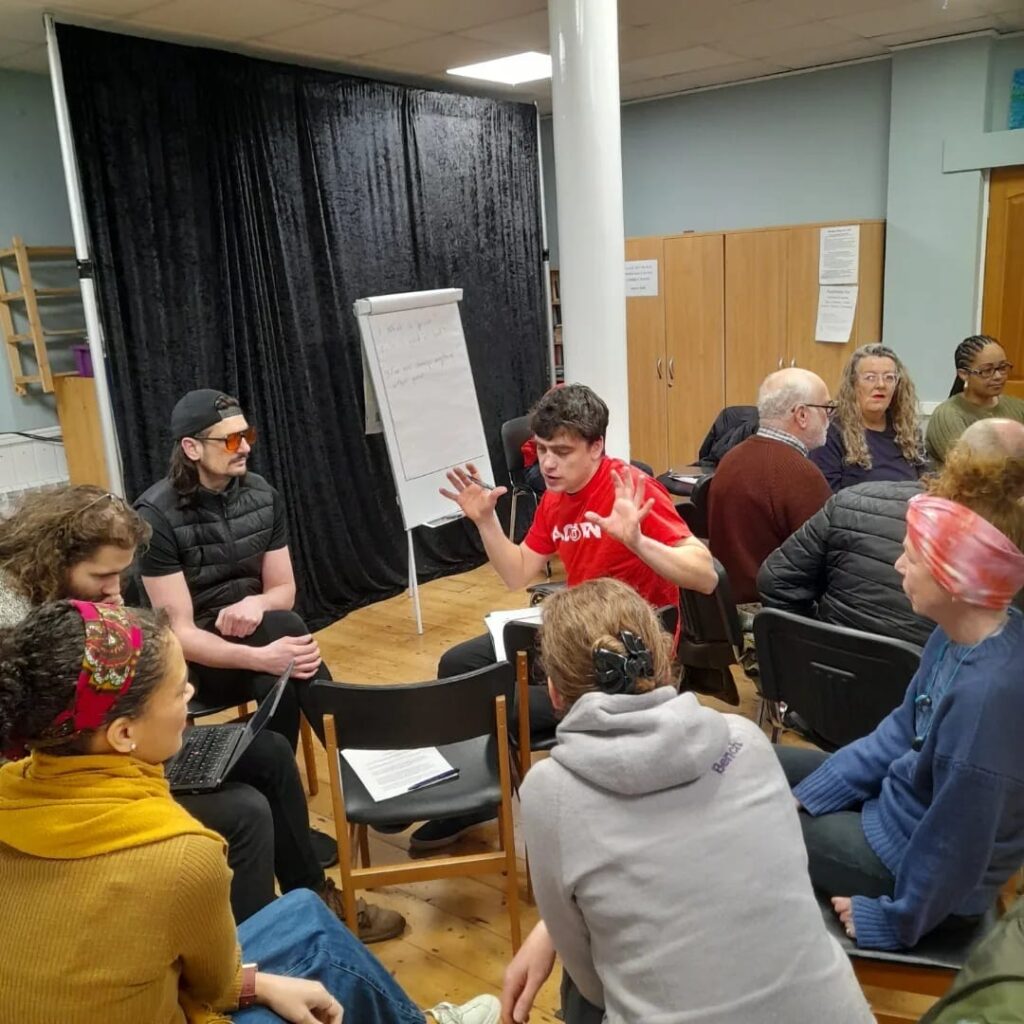Merlin Betts
Voting time on Acorn’s launch day at His Place Community Centre. Acorn is like a trade union that can represent people regardless of trade, especially renters. We need that in a town with rising rents and a housing crisis. They also lobby on related things that matter to us, like cost of living. Check ’em out, join up.
I don’t know if you’d have heard of Acorn before. Maybe if you’re an ‘OFB’ from Bristol of Brighton, or that rarer beast, a DFN – down from Norwich. If only we could picket and protest silly acronyms, right? Imagine if we had some kind of… I don’t know… ‘union’. A way of organising for that kind of activity. Maybe we could use it for something more important even, like protesting unfair rent increases, or landlords’ love of this Hastings mould which seems to permeate half the bloody town.
Well, guess what? Acorn is this community union of which we speak, and it’s here, now. You can join it. Basically it’s like a trade union, but for poor and disenfranchised people of any trade, or none. The “community” here is a collection of voluntary members from a neighbourhood (usually in the bigger sense – a town or city) organising to protect and improve their living conditions.
Like trade unions, Acorn uses direct action (boots on the ground, hands around placards) to compel government agencies, private businesses and individuals to improve their behaviour toward Acorn members.
A lot of their activity focuses on renters’ housing disputes and related government policy, but they’ve also won on other basics like free school meals. And they’re of course part of the national Enough is Enough campaign demanding pay rises, cheaper energy, higher taxes for the rich and an end to food poverty – as well as the standard “decent homes for all”.
Some notable past Acorn victories: a bailiff ban in Manchester; a council tax cap for the poorest in Bristol; stopped public toilets being shut in Brighton; took the buses in Oxford back into public ownership; and doubled council tax on second homes in Leeds. Not bad, right?
Acorn started in Bristol about a decade ago. It maintains a democratic structure and will only serve its members, who pay a nominal fee for their membership. So if you want to get its support, join up. It’s primarily (perhaps exclusively now) funded by membership subscriptions and donations, but had some government match funding in its early years when membership numbers were (necessarily) low.
Each neighbourhood branch of Acorn has a committee of at least four, elected by their members and if, it comes to it, removed by them. These four organise and oversee much of the branch’s activity, deciding which cases to fight and where to deploy resources.
The national Acorn organisation works on bigger lobbying campaigns, or launching new branches, but otherwise leaves local organisations to manage themselves.
Community Organisers

While I have to emphasise that Acorn is a membership organisation, it’s also interested in the needs of the broader community – because its members come from that community and are still part of it.
The idea behind Acorn is really just to mobilise people, it’s not an exclusive members club, it’s a way of organising people and their resources to achieve common goals. Part of that whole process is regularly going out and asking people what they care about, what their problems are, listening carefully to their responses and either signposting them to help, or offering them a chance for more direct assistance i.e. joining up and starting an Acorn action or campaign.
So Acorn members will regularly go door-knocking to listen to their neighbours and find common ways of dealing with problems. They’ll keep stalls at community events and centres, or the middle of town on a busy day, inviting people to forward their issues and get a fair hearing from a sympathetic ear. You might have met them out in Hastings already.
Our local branch’s launch day on 24 February was, in a sense, one of these organising actions. Apart from electing a committee, it was a chance for anyone to pop in, learn a bit about Acorn, and to share their problems and experiences. I’ve been to a couple of local Acorn events and have been consistently surprised – in a good way – at how seriously they take this idea of listening, giving attendants at an event the chance to develop and express their ideas. It creates this sense that we’re all in it together, which you don’t have when a rep is constantly shutting people down to move onto the next segment of a pre-written talk. Acorn is more adaptive, more personal.
Organising enables the union to expand, both in members and finances, allowing it to take on more and bigger cases and actions.
While it might ally itself with various other local organisations, an Acorn branch’s main task is forcing existing actors (like landlords) to maintain their responsibilities and respect the rights of Acorn members. Acorn won’t buy land for a co-operative or run its own housing, say. That kind of activity is for other groups, its allies. Although a branch might lobby for legal changes in local or national government, and hopefully do so with the assistance of other relevant organisations.
Member Defence

Much of Acorn’s work is direct action in defence of its members.
Imagine here a mother and Acorn member who lives with her young child. The child’s bedroom window won’t close properly and the room is damp, with mould all over the ceiling. The oven is also broken (and we’re assuming here that white goods are a landlord responsibility). She’s contacted the landlord repeatedly to fix these issues but been ignored. The estate agents, in as much as they’re responsible, are also ignoring her.
So after the usual opening – making an attempt to contact the landlord both directly and via the agents – if they’re still being ignored, Acorn could begin a campaign among the member’s neighbours and at the child’s school, maybe to sign a petition to the landlord and the agents to rectify these issues. While doing that, they’d be likely to mobilise other renters affected by similar issues, perhaps renters with the same landlord if we’re talking about a monolith like Southern Housing. This could expand the scope of their campaign. They might try to visit the landlord’s address (or find a relevant agent of the landlord and visit their address), they might picket the estate agents, write to a local councillor, and generally escalate the scale and visibility of their actions until something useful is done in response.
They don’t mind looking scary and being annoying, and no target is too big. At the same time, to make the best use of their (usually) limited resources, an Acorn branch will prioritise cases that can deal with larger issues, mobilise more members and lead to more support. And a branch will respond in an appropriate way to each situation brought by a member. Sometimes this will just mean signposting people to other organisations and services, or in cases of unfair eviction, it might mean organising members to resist bailiffs on the day of eviction.
Acorn won’t provide detailed advice or advocacy, though it might know other organisations that do. It’s a community union, meaning it provides direct action in response to abuses – and that’s it.
So… wanna join? I did, for the princely sum of £4 a month (which is currently more than my hourly wage) because we need this kind of representation, this organisation, this ability to tell the people ruining our lives “no, you can’t do that.” So get involved, the more of us that do, the more power for change we have.
Contact: naomi.gann@acorntheunion.org.uk, hastings@acorntheunion.org.uk or visit their website acorntheunion.org.uk.

